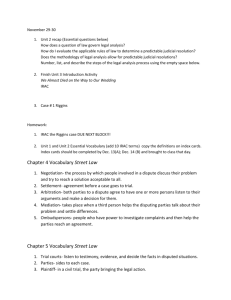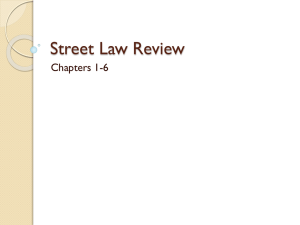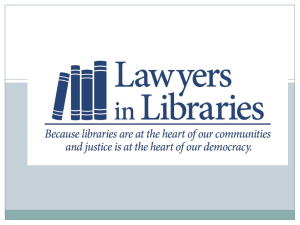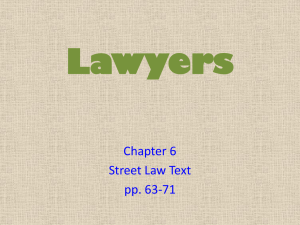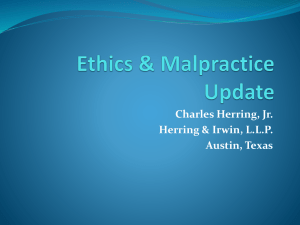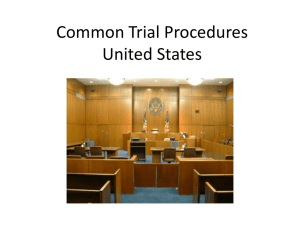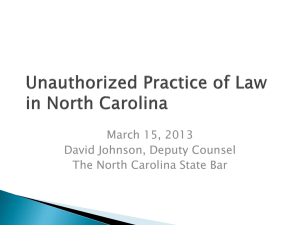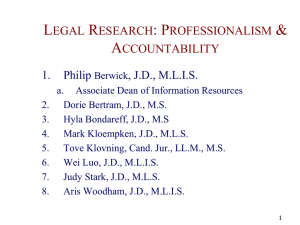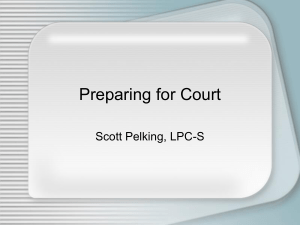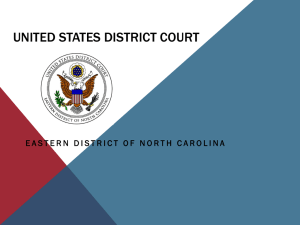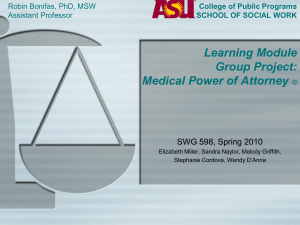the legal ethics of social media
advertisement
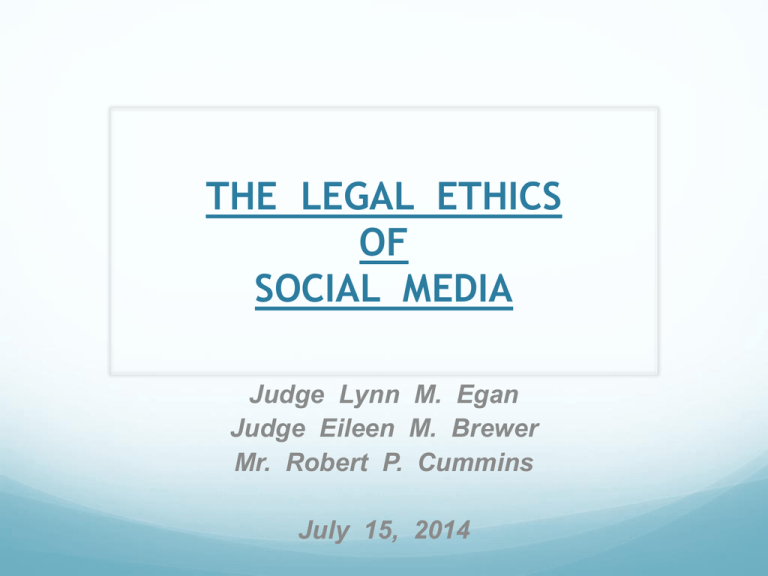
THE LEGAL ETHICS OF SOCIAL MEDIA Judge Lynn M. Egan Judge Eileen M. Brewer Mr. Robert P. Cummins July 15, 2014 WHAT IS SOCIAL MEDIA? Social Networks – Allows people to connect with others of similar interests. Typically includes a profile & ways to interact with other users, i.e., Facebook & LinkedIn. Microblogging – Allows users to share short updates with other subscribers, i.e., Twitter. Blogs – Online forums that allow conversations by posting messages. Media Sharing – Allows people to upload & share pictures & video, with features such as profiles & comments, i.e., YouTube. Social News – Allow peoples to post news stories or links to articles & then allows users to vote on the items, i.e., Reddit. IT IS COMING TO YOUR CASE – SOON! The average adult spends 11 hours a day on digital media & 23 hours a week texting. Over 6 billion hours of YouTube are watched every month. (“Always On: How Media Usage is Taking Over Our Lives,” by Michael Wolff, USA Weekend, July 11-13, 2014) POSSIBLE ISSUES: Client management – should plaintiffs’ attorney’s contingent fee agreement address the client’s social media resources? Require that those resources be shut down or eliminated? Discovery – Relevance is the touchstone concept. “Privacy” is not. Also, be mindful of need to authenticate – how will you establish the evidentiary foundation for online postings, particularly if the alleged author denies them? Trial – How far can you go in researching witnesses, or jurors? What are your duties to disclose/report? KNOW YOUR JURISDICTION This topic is evolving – quickly! Not much case law – none in Illinois. Ethical opinions vary state to state so understand your jurisdiction’s ethical rules about advertising, solicitation & communication about yourself & your firm’s services. They all apply to your online activities. Pay close attention to the work of the Illinois Rules Committee & Discovery Committee. New rules just adopted about ESI & both continue to work to further refine them. Must know in order to correctly advise your clients. WHERE TO BEGIN? Practical Law article: “Social Media: What Every Litigator Needs to Know.” Business Law Today article: “10 Tips for Avoiding Ethical Lapses When Using Social Media.” ABA Formal Opinions 457 (“Lawyer Websites”) & 466 (“Lawyer Reviewing Jurors’ Internet Presence”) National Center for State Courts – state-by-state listing of court electronic device policies & jury instructions about social media. DISCOVERABILITY Judge Eileen M. Brewer SCENARIOS - #1 A lawyer hires a web designer to update her website, which includes the following language: “Cook County’s best medical malpractice attorney” & describes the attorney as a “personal injury specialist” who would get clients “the settlement you deserve.” Any ethical issue with the language of the website? Does use of a web designer insulate the attorney? What if the website allows viewers to pose legal questions? SCENARIO -- #2 & #3 In a “priest abuse” case, defense counsel seeks discovery of all social media (public & private Facebook, Twitter, etc.) reflecting the current conduct of plaintiffs, who claim to have been abused. The argument is that this discovery will reveal that their claims of ongoing injury are not well founded. In a defamation action premised on plaintiff’s statements that defendant sexually abused her minor son, defense counsel seeks discovery of plaintiff’s Facebook account, arguing that the information will corroborate the belief that plaintiff is gay & this fact makes it more likely that he sexually abused a young boy. QUESTIONS Is the concept of relevance any different as applied to social media? Are “private” postings afforded more protection than “public” postings? Can attorney advise client to shut down or delete Facebook postings after receiving motion to compel? What happens if he does? Is it malpractice for an attorney not to pursue “social media discovery”? What if client loses the case, but later discovers that a third party had e-mail evidence that would have changed the result? What if client inadvertently fails to disclose a 2nd, relevant, e-mail account until after successful trial result? What is the lawyer’s duty? A third party contacts attorney after trial & reveals relevant e-mail that should have been disclosed by the client. When confronted, the client tells the attorney, “The trial is over. Don’t worry about it.” What must the attorney do? SCENARIO -- #4 It is Monday morning of the 3rd week of a high profile drug trial. Judge Megan O’Brian presides. Before becoming a judge, O’Brian was head of the DA’s special prosecution unit. The prosecutor for the current trial previously served with O’Brian in the DA’s office & they are “Facebook friends.” Prior to the start of evidence, O’Brian granted defendants’ motion to suppress a significant piece of evidence, which is a serious blow to the prosecution case. The prosecution rested its case after presenting its final witness, a forensic expert, Dr. Snow. SCENARIO -- #4 Prior to start of the defense case, the attorney for one of the defendants tasks a 2nd year associate from his firm with delivering exhibit binders to the courthouse. While waiting to do so, he overhears the following conversation between people he assumes are jurors on the drug case: MAN A – “I didn’t like that Snow guy so I Googled him over the weekend. You know what – this so-called PhD left one of his university teaching jobs after being accused of plagiarism. I just knew this guy was a phony.” MAN B – “Judge O’Brian told us not to do that & that we shouldn’t talk about the case.” MAN A – “You’re right. Forget we had this discussion.” SCENARIO - #4 When the trial attorney arrives at the courthouse, the young associate tells him about the conversation. The trial attorney tells the young lawyer not to say a word to anyone or he will be in “big trouble.” When his co-counsel asks why the associate was so excited, the attorney responds, “You don’t want to know.” Co-counsel then says, “Well, there is something I need to tell you. The law clerk who was doing a background check on the jurors for me sent a “friend” request to one of our jurors. This juror’s uncle is an in-house lawyer for one of our clients & I have worked with him. He called me to tell me about the contact & I told him it was a mistake. He assured me the matter was closed & that the juror would not say a word.” QUESTIONS How far can you go in checking on jurors? (ABA Formal Opinion No. 466). Is a lawyer’s failure to check the Facebook status of sitting jurors a breach of competence? What is a lawyer’s duty to report juror misconduct? What is the young associate’s duty after the trial attorney tells him not to say a word about the jurors’ conversation? What duties do the trial attorneys & in-house counsel have to report the “friend request” to the juror? Do the judge or prosecutor have a duty to disclose their status as “Facebook friends”?
